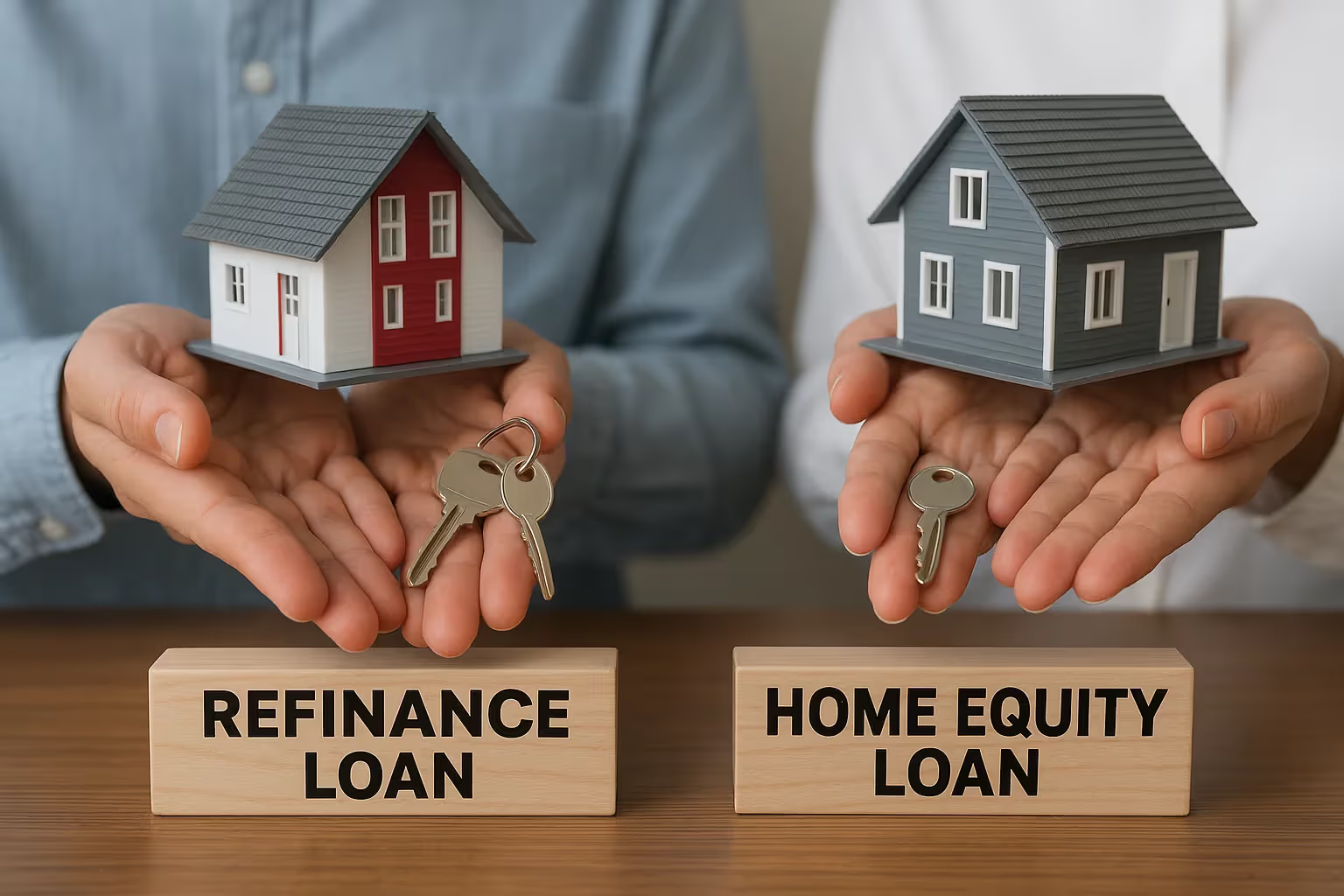.avif)
When it comes to managing your home finances, two popular options often come to mind - refinance and home equity loans. Both allow you to leverage the value of your home, but they work differently and serve distinct financial purposes.
Understanding the difference between a Refinance loan and a home equity loan can help you make the smartest decision for your financial future. This article breaks down how each works, their pros and cons, and how to decide which option best fits your goals.
What Is a Refinance Loan?
A Refinance loan replaces your existing mortgage with a new one - often with better terms. The goal of refinancing is to improve your financial situation, such as reducing your interest rate, lowering monthly payments, or changing the length of your mortgage.
When you refinance, you essentially pay off your current loan with a new one. Depending on your needs, you can choose between:
- Rate-and-term refinance: Changes your loan’s interest rate or term or both.
- Cash-out refinance: Lets you tap into your home’s equity and get cash in hand.
For example, if your home’s value has increased and you owe less than its current worth, you can use a Refinance loan to withdraw some of that equity while securing a better rate.
What Is a Home Equity Loan?

A home equity loan, sometimes called a 'second mortgage,' lets you borrow a lump sum using your home’s equity as collateral. You don’t replace your current mortgage - you add another one.
Home equity loans typically have fixed interest rates and fixed monthly payments, making them predictable and easier to budget for. The amount you can borrow depends on your home’s appraised value and the amount of equity you’ve built up.
If you’ve paid off a large portion of your mortgage and your home’s value has appreciated, a home equity loan can provide access to significant funds without disturbing your existing mortgage.
The Key Differences Between Refinance and Home Equity Loan
Although both options use your home’s equity, there are important distinctions in how they work. Let’s break them down clearly.

When Should You Refinance?
A refinance makes the most sense when your goal is to improve your overall mortgage terms. You may want to consider a Refinance loan if:
- Interest rates have dropped - Lowering your rate can save you thousands over time.
- You want smaller monthly payments - Extending your loan term reduces the monthly burden.
- You want to switch from an adjustable to a fixed rate - For stability and predictability.
- You need cash for big expenses - A cash-out refinance lets you use home equity for things like renovations or debt consolidation.
For example, if you bought your home when rates were high, a Refinance loan now could significantly cut your payments and help you pay off the home faster.
When Should You Choose a Home Equity Loan?
A home equity loan might be a better fit if you already have a great mortgage rate and don’t want to replace it. Instead, you can borrow against your home’s equity to fund major expenses such as:
- Home remodeling or upgrades
- College tuition
- Medical bills
- Starting a business
The main advantage of a home equity loan is that it allows you to keep your current mortgage intact while still unlocking the value of your home.
Pros and Cons of Refinance Loans
Pros:
- Potential for lower interest rate
- Opportunity to change loan term
- Option for cash-out refinancing
- Simplified monthly payment structure
Cons:
- Closing costs and fees may apply
- Extending the term could mean paying more interest long-term
- Requires a credit check and appraisal
While refinancing can help you save money or free up cash, it’s important to calculate whether the savings outweigh the costs.
Pros and Cons of Home Equity Loans
Pros:
- Access to large sums of money
- Fixed payments and interest rates
- Interest may be tax-deductible for home improvements
Cons:
- Adds another monthly payment
- Higher interest rates than refinance options
- Puts your home at risk if you can’t repay
A home equity loan can be powerful, but it’s crucial to borrow only what you can comfortably afford to repay.
Which Is Better: Refinance Loan or Home Equity Loan?

The answer depends entirely on your goals and current mortgage situation.
- Choose a Refinance loan if your main goal is to lower payments, secure a better rate, or change your loan term.
- Choose a home equity loan if your existing mortgage rate is already favorable and you only need additional funds for specific purposes.
If you need both a lower rate and cash, a cash-out refinance may be your best solution.
Real-Life Example
Let’s say you purchased your home for $300,000 five years ago with a 6% mortgage rate. Today, your home is worth $400,000, and mortgage rates are at 4%.
By taking a Refinance loan, you could:
- Replace your old mortgage with a new one at a lower rate
- Reduce your monthly payment
- Access $50,000 in cash for renovations
In contrast, a home equity loan would give you the $50,000 directly but keep your 6% mortgage in place - resulting in two separate payments.
In this scenario, refinancing might offer a simpler and more cost-effective path.
Final Thoughts
Both refinance and home equity loans are valuable financial tools - but they serve different purposes. A Refinance loan is ideal for those who want to improve their mortgage terms and potentially save money in the long run. A home equity loan works best for homeowners looking to borrow a specific amount while keeping their primary mortgage unchanged.
Before deciding, compare rates, calculate costs, and consider your long-term goals. The right choice could save you thousands and give you greater control over your home’s financial future.

Alex Chen

Alex Chen













Get in touch with a loan officer
Our dedicated loan officers are here to guide you through every step of the home buying process, ensuring you find the perfect mortgage solution tailored to your needs.
Options
Exercising Options
Selling
Quarterly estimates
Loans
New home

Stay always updated on insightful articles and guides.
Every Monday, you'll get an article or a guide that will help you be more present, focused and productive in your work and personal life.









.png)
.png)
.png)
.avif)
.avif)
.avif)
.png)
.png)
.png)
.avif)
.png)
.png)
.avif)
.png)
.avif)
.png)
.avif)
.avif)